KILLING FISH (PART THREE)
The bureaucratic nightmare: Unlicensed Kalk Bay fishers beached by fishing quotas
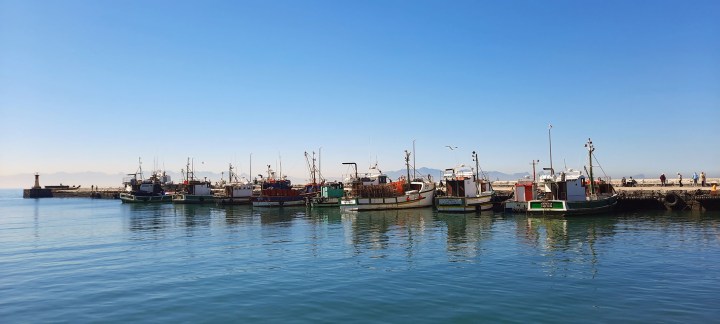
Something has gone seriously wrong with the issuing of fishing quotas in pursuit of transformation, and it’s killing the historical small-boat industry that’s at the heart of picturesque harbours like Kalk Bay.
An alien civilisation coming across our solar system would name our planet Ocean, for most of Earth is under water. Being air-breathing and living on the bits that stick out, we mostly regard the vast liquid blue that surrounds us as a beautiful but often scary “other”. Billions of us, however, rely on it for food. This is Part Three of a series about the relationship between the creatures below the sea’s surface and the people in boats who catch them. Read Part One and Part Two
Swells curling in off the end of the pier are causing the colourful fishing boats to nudge the jetty, their hawsers dipping and tightening. With the swells comes the ozoney smell of tumbled seawater mixed with that of a kelp forest just off the breakwater. Beyond the picture-postcard harbour is the old fishing village of Kalk Bay, a jumble of quaint shops and houses wedged between the ocean and the sharply rising slopes of Trappieskop.
Kobus Poggenpoel and Sedidc Ahmad, fourth-generation fishermen and no longer young, sit on the sea wall gazing at the colourful, high-prow boats.
‘They killed this harbour’
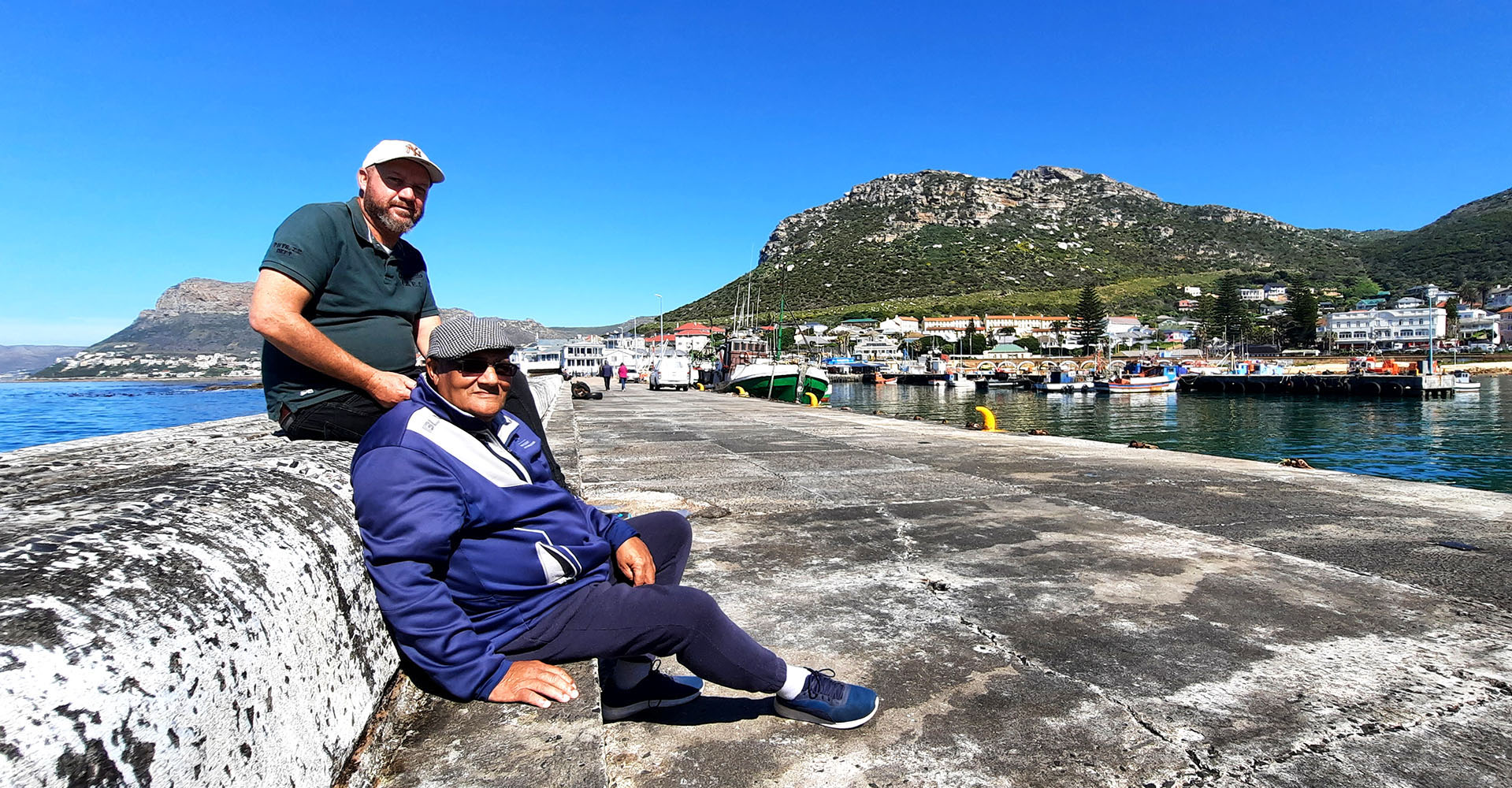
Sedidc Ahmad, left, and Kobus Poggenpoel of Kalk Bay, Cape Town, are fourth-generation fishers with no licence to fish. (Photo: Don Pinnock)
“We used to supply the whole of the Cape Flats with fish,” sighs Kobus, shaking his head, “but the government took away our licences, just like that. We have the equipment and generations of experience but no rights to fish.
“They killed this harbour, the oldest small-boat fishing harbour in South Africa. It’s dead. It’s been like this for nearly 20 years, since Fisheries came up with new regulations, a new quota system. Our fishing boats, some that came from our grandparents or which we had made or bought, are just rotting in their moorings.
“Maybe you come here soon and see just rich people’s yachts and fancy restaurants. Where will we be? I don’t know.
Another well-known Kalk Bay fisher is Tony Trimmel, whose house is just up from the harbour. “I used to be able to see the boats from here in my lounge,” he says as we sit surrounded by pictures of boats and a bookshelf housing four generations of fishing information. “They built the school right in front of me. But I can still smell and hear the sea.”
Tony is engaging and hugely knowledgeable about fishing and the life of Kalk Bay. Both his mother and father, his grandparents and great grandparents were in fishing. His mother is a descendant from Filipinos who started the industry in South Africa, his father from the Portuguese lineage who embraced pelagic fishing generations ago.
When fishing used to be good
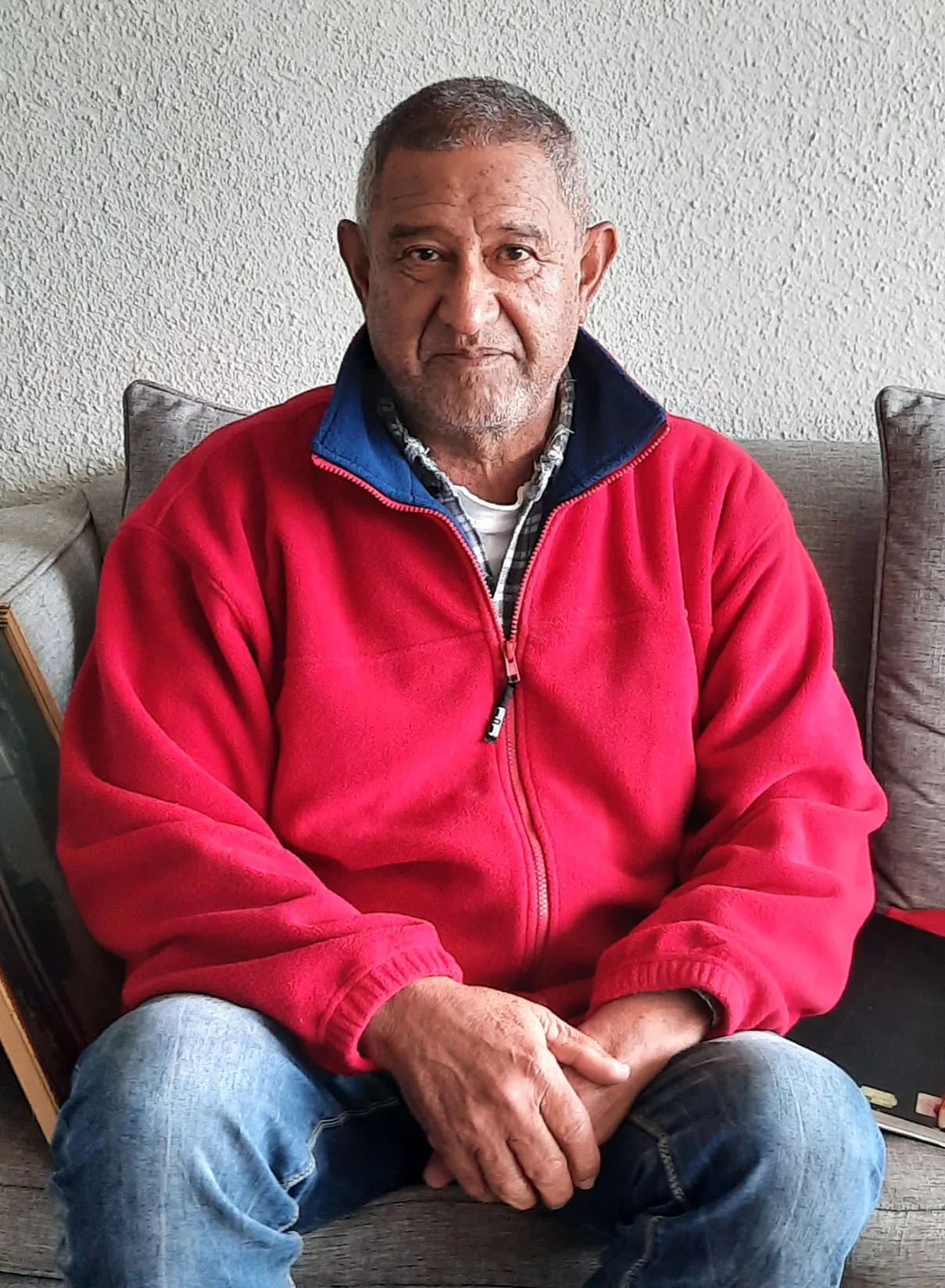
Tony Trimmel, a fourth-generation fisher, is hugely knowledgeable about fishing. (Photo: Don Pinnock)
“My father inherited his first boat from his grandfather and had another boat built which I eventually acquired. Fishing used to be good when there was an abundance of fish. Shoals would migrate into False Bay or Hout Bay on an annual basis; you could predict them to the day. Ancient patterns. Not many boats were targeting them.
“Our fishing boats weren’t motorised before about the 1930s and still very few in the 40s and even 60s. Before that they were row and sail boats. They were lighters towed behind sailing boats coming from England or the East but ended up here.
“There weren’t many harbours in those days so they’d be used to ferry goods. Some were left behind and turned out to be excellent for fishing. The wooden boats we have now were made by shipbuilders in Cape Town or up the West Coast. Brilliant builders. Some are 70 or 80 years old and still fine.
Tony sips his tea and stares out the window at the classroom blocking his view. “It used to be different,” he says. “Back in the 60s and 70s there would be up to 50 boats in Kalk Bay – handline and crayfish boats, pelagic trawlers and pleasure boats. In the handlining sector we could catch any species. Some boats could catch crayfish, trawl as well as do traditional handline. That’s all gone.
“Some old guys today said they could see the fish stocks starting to decline even in the 50s and 60s, though there was enough to keep the small-scale fisheries growing. But you can only say you’re as good as you are if there are fish to be caught. People didn’t think to diversify. When fish started to get scarce and the new quota system came they would get hurt.
“There used to be so many fish right here. From the breakwater you could feed your family with a fishing rod. They would catch fish and they would catch fish and they would catch fish until they didn’t know what to do with them. Inside the harbour we would catch white stumpnose; masses would come. Always there.
“But from around 2000 it was as if a light switch was switched off. The fish just disappeared. Was it the Navy, was it pollution, was it foreign fishing vessels? We don’t know why. Just gone.
“Then in the new democracy, fishing licences were allocated to ‘the citizens of the land’, not to coastal communities, who should have been the first recipients.
“If you were living in Pretoria you could apply for a quota among 22 species. There’s no sea there, but you’re black-owned and have a piece of paper saying you’re a rights holder. You also have no boat. So you do a deal with a coastal boat owner. ‘Can I use your boat on my quota application?’ In struggle times coloureds and Indians were black, but now they don’t qualify as black owned.
“With your piece of paper you could then go to a big fishing company and say you can use my quota for a fee. For doing nothing. So the old monopoly companies aren’t losing out in the end, we are.
“But it gets worse. Before, you as a boat owner would apply for a licence. But now members of my crew can also apply for a licence and put my boat on their application. They’re classed as small-scale fishers. And they get the licence and I don’t, so they own my right to fish. The boat is under their command. And they say to me if you want to go to sea you must come fetch us at home all over the Cape Flats – for free.
“But as an owner you can’t keep up with maintenance. The engine breaks, you have to replace a gearbox, repair the woodwork. It’s not worth taking a boat out of the harbour. So you apply for a licence in another sector, maybe rock lobster or pelagic. And again you’re turned down.
“The allocations are such a corrupt system. You have to tell your story to a quota board, but it’s no use because people with influence can buy quotas. People connected to politicians are the first recipients. You’re never going to be able to prove it, but everybody in the industry knows it. And the online licence application system is a nightmare and stacked against us.”
The quota quagmire
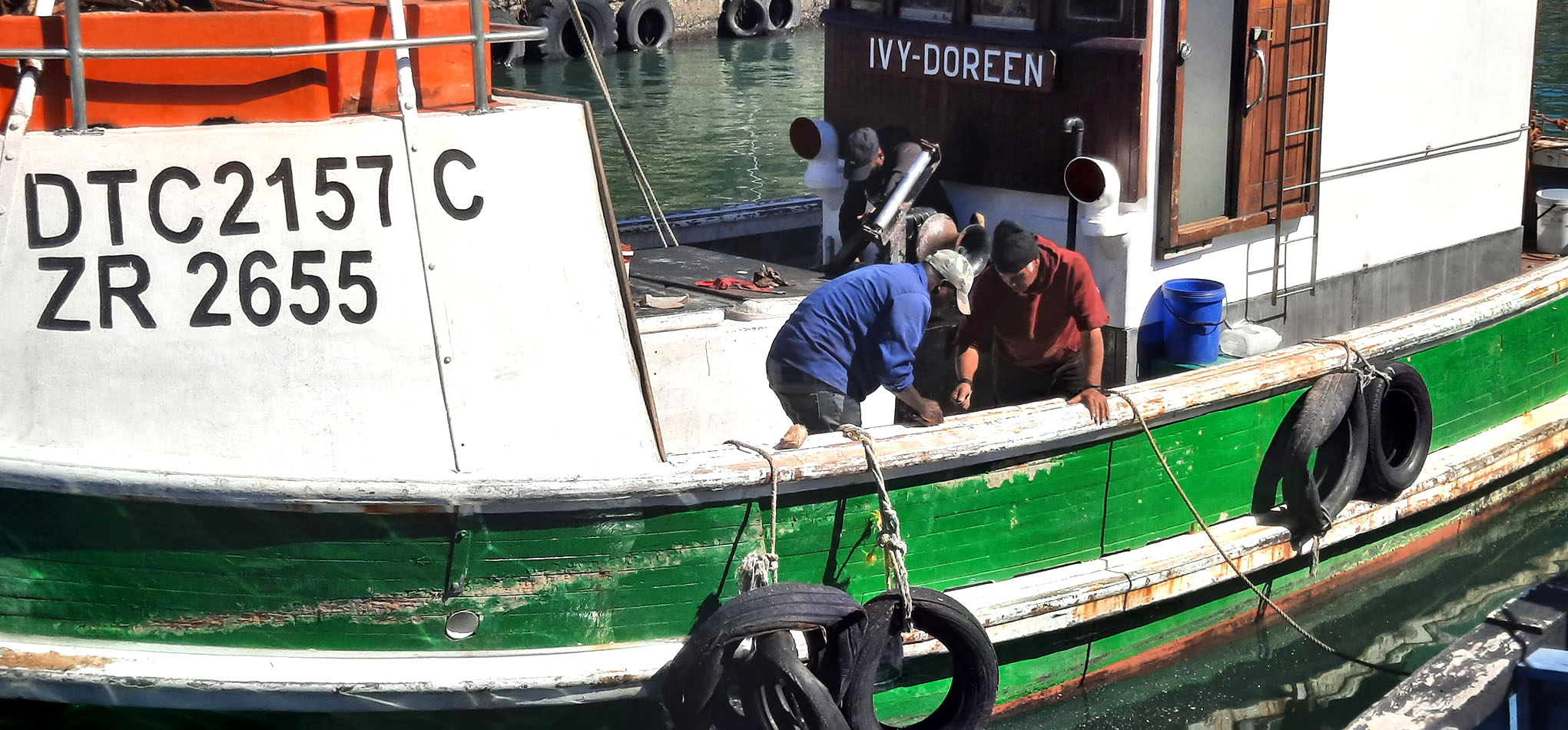
Despite quota restrictions, boats must be maintained as owners hope for reprise. (Photo: Don Pinnock)
The deeper I dig, the more entangled it gets. A big problem appears to be the toxic intersection of corruption and inefficiency in the history of state fisheries management.
The claims and counterclaims of malfeasance, corruption, insider trading, theft of poached abalone and bogus contracts stretching back over a decade is bewildering. Departmental officials came and went with confusing rapidity, trailing suspicions in their wake and administrative sections in turmoil.
On its website, the natural resources advisory firm Feike notes that “the South African fisheries management branch remains in a state of perpetual turmoil with senior officials accusing each [other] of corruption and involvement in organised criminal activities involving corrupt tender allocations and benefitting from the trade in illicit abalone”. (Confiscated poached abalone is resold to fund Fisheries, so why end poaching?) The organisation Corruption Watch headed its report on the goings-on: Fisheries Department rots from the top.
For help I turn to a man who laid the foundations of Fisheries policy but is now wholly disaffected by what it’s become: Advocate Shaheen Moolla. He was legal adviser to Minister Valli Moosa, when he was Minister of Tourism and Environmental Affairs, and was later the chief director responsible for fisheries management and compliance. Moolla was part of a team, including Horst Kleinschmidt and Chippy Olver, who were brought in early in the 2000s to clean up the rot and lay down a workable fishing policy for the country.
First off, they hit the Hout Bay Fishing Industries (Pty) Ltd for corruption, taking 12 Fisheries officers to court for receiving bribes. They were accused of taking R50,000 per boat landing. The team’s core focus, however, was to lay down a reasonable quota system.
“I was essentially asked to run the 2005 fishing allocation process,” Moolla tells me as we drink coffee overlooking central Cape Town. “Quotas were issued annually, but who’s going to lend you millions to develop your operation on that?
“We decided to go for medium-term allocations for four years across 22 commercial fishing sectors, starting in 2001. We eventually pushed it up to between eight and 15 in 2005. We tried to separate commercial and small scale, despite the fact that small scale is also commercial. You can’t class a Kalk Bay fishing boat with a huge deep-sea trawler.
“The 2005 allocations tested all that and they worked. The False Bay linefish guys were earning well; they had quota security. We divided the quotas into four sectors. A was commercial deep-sea; B was smaller offshore commercial; C was near-shore small-scale like the Hout Bay guys; and D was for marginals like mussel collection.
“We had brilliant Fisheries scientists and a good idea of fish stocks. Then Marthinus van Schalkwyk became minister and that’s when it all started to come apart, principally because he was politically unable to keep corrupt ANC cadres from the door of Fisheries and quotas.
“In early 2005, an ANC parliamentary group responsible for Fisheries arranged a ‘study group’ meeting where Kleinschmidt and I were requested to brief them on the state of fisheries management.
“Instead, it became a meeting about how many coloureds, Indians and whites we employed. They weren’t interested in the state of fisheries management, the socio-economic and biological consequences of the 2001 rights allocation process or the state of the deployment of the then recently procured Fisheries patrol vessels.
“Instead the ANC politicians complained that we were racists as we had 0.18 too many Indians and 130 too many coloureds employed at the department. They said requiring Fisheries scientists to have an MSc was intended to exclude black scientists. They claimed it was racist to require Fisheries control officers on patrol vessels to have competency in swimming ‘because it’s known that blacks can’t swim’.
“It was the last straw for me. I resigned the next day and Horst also left.
“Van Schalkwyk was followed by the egregiously corrupt Tina Joemat-Petterssen and certain equally corrupt staff members. This precipitated the near-complete collapse of fisheries management.
“That started with the 2013 fishing rights allocation process. It was principally an allocation that concerned small-scale fishermen and fishing rights in the traditional linefish, hake handline, oyster, mussels and abalone fishing sectors.
“They botched those allocations to the point where communities like Kalk Bay were left decimated. I think only three Kalk Bay boats got a traditional linefishing right.”
When I asked the Department of Forestry, Fishing and the Environment (DFFE) whether this was true, they disagreed. “This is not the case. Out of 148 small-scale fishers who applied to be recognised and to be granted fishing rights in Kalk Bay under the small-scale fishing sector, only four applicants were unsuccessful.”
Moolla dismissed that reply. “DFFE deliberately confuses small-scale with small-scale commercial. The Kalk Bay guys with boats are small-scale commercial. Fisheries can’t seem to understand that our small-scale fisheries are traditional linefish, oyster and mussel harvesting, abalone, nearshore lobster. These are fisheries harvested by individual artisanal fishers.
“What they consider ‘small-scale’ is a bizarre construct of co-operatives which have failed dismally from Port Nolloth to every coastal village of the Eastern Cape. Every right granted to a co-operative has either been squandered or sold to a commercial operator and these co-ops then just sit and wait for rents.
“They were allocating rights to every Tom, Dick and Harry who were associated to the ANC that had no history of fishing, like ANC councillors. The 28 gangster Ernie Lastag’s family got linefishing rights.
“These people weren’t fishermen. They didn’t have the ability to actually fish. They used their licence as a lottery ticket. But with small-scale fisheries you have to work the quota. It would be like giving some guy 10 acres of land and call him a farmer. It doesn’t work that way. You need equipment, you need knowledge.
“When a process allocates rights to people from every part of the country without a boat, without a history of fishing, without processing investment or marketing access and denies four generations of fishermen, well, then you must accept that you’ve got a problem. It’s an arbitrary, flawed process that has denied legitimate fishermen their right to fish.”
“In the beginning,” Horst Kleinschmidt told me some time back with a note of regret as we sat on his veranda overlooking False Bay, “I didn’t know what I was getting into. “You can’t run a socialist system inside a capitalist economy. It just doesn’t work.”
System collapse
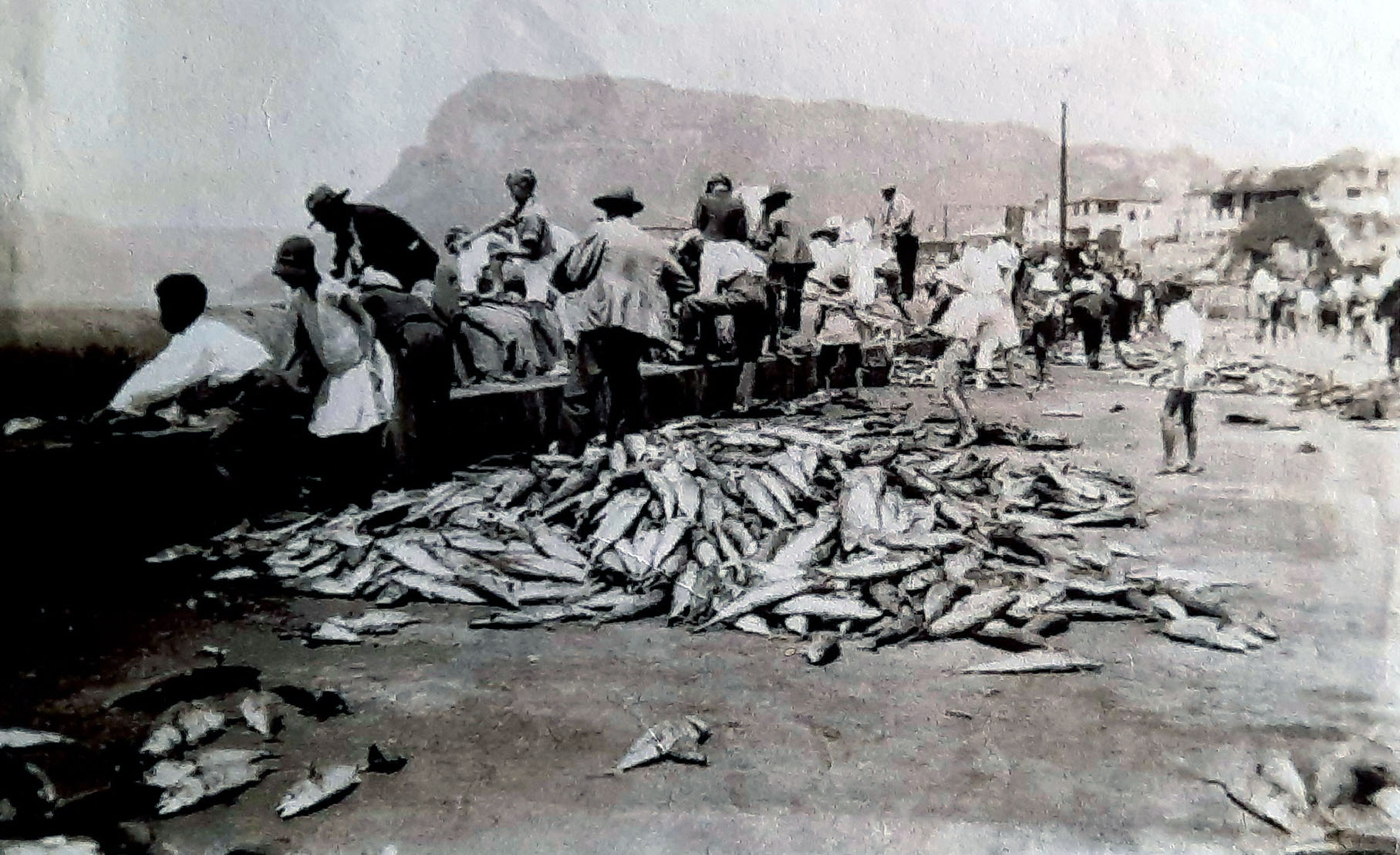
When fishing was great off the Kalk Bay pier. (Photo: Supplied)
“What we’re looking at,” Moolla says, “is a pretty significant collapse of fisheries management. In 2005 we had 22 functioning fisheries; we ought to have had 32 today but barely 13 are functioning.
“There’s also bribery on quotas. It’s an open secret: nobody lands legal kingklip in Table Bay Harbour. There’s R100,000 cash bribe for everybody. There’s a strict bycatch limit on kingklip; it’s a percentage of your quota. So for example if you land 10 tonnes of hake today, you can only land 70 kilos of kingklip, but you have seven tonnes which is worth maybe four or five million. Against that, a R100,000 bribe is nothing. Everybody knows. And massive bycatches are hammering the resource.
“For small fishers, the online licence application system is deeply flawed, unintelligible actually.
“You’re down-scored by what you fail to answer. I mean what’s a Kalk Bay fisher to enter when he’s asked to state his company’s dividends?
“The forms and process were never designed for an online application system. The system went live in late November 2022 and the forms were simply unusable. They were changed almost daily without anyone knowing about these changes. It prejudiced small-scale applicants, who didn’t have teams of professionals monitoring changes daily. The chaos caused so much harm and resulted in rights being lost.
“If you don’t get a licence you can appeal to the minister. But it takes so long to get your appeal heard that you go out of business waiting. Then maybe you’re turned down anyway. It’s gross inefficiency. You have people at Fisheries making decisions that know nothing about fishing. They’ve ruined what should have been a very successful fishery.
“It’s debilitating for these guys sitting on the breakwater at Kalk Bay asking, ‘Why have we been denied the right to fish? Is it because we’re coloured?’
“There’s a forlornness that’s depressing, because these guys are the mainstays of small commercial fishing. Their traditions go back to the 15th century. It’s the linefishing they mastered that gave birth to the I&Js, Lucitanias and Coronations.”
Back in Kalk Bay, I’m talking to Tony Trimmel when his son Lorenzo arrives home for lunch.
“Is he in fishing?” I ask.
“No, he’s in the baking industry. Fishing’s no longer a life for young people here. Anyway I’ve cut up my boat. I can’t afford the docking fees. It’s over. It’s all over…” DM






















 Become an Insider
Become an Insider
The anc did this, they revoked the licenses and quotas for subsistance and small scale fisherfolk and awarded them to their buddies and cadres, I saw licenses and quotas being awarded to black woman owned cleaning companies wo had no idea what a boat looked like let alone how to fish
And guess who’s responsible for destroying the small scale fishing industry – Tina Joumase Peterson.
This is tragic. The hateful ANC cadres have f***ed yet another industry. My heart goes out to these people.
Look a bit deep and you will find Zinzi “M” got massive offshore quotas and she sold them to a Spanish fishing company that has been banned in South Africa and elsewhere for poaching and over catching their licenses quotas